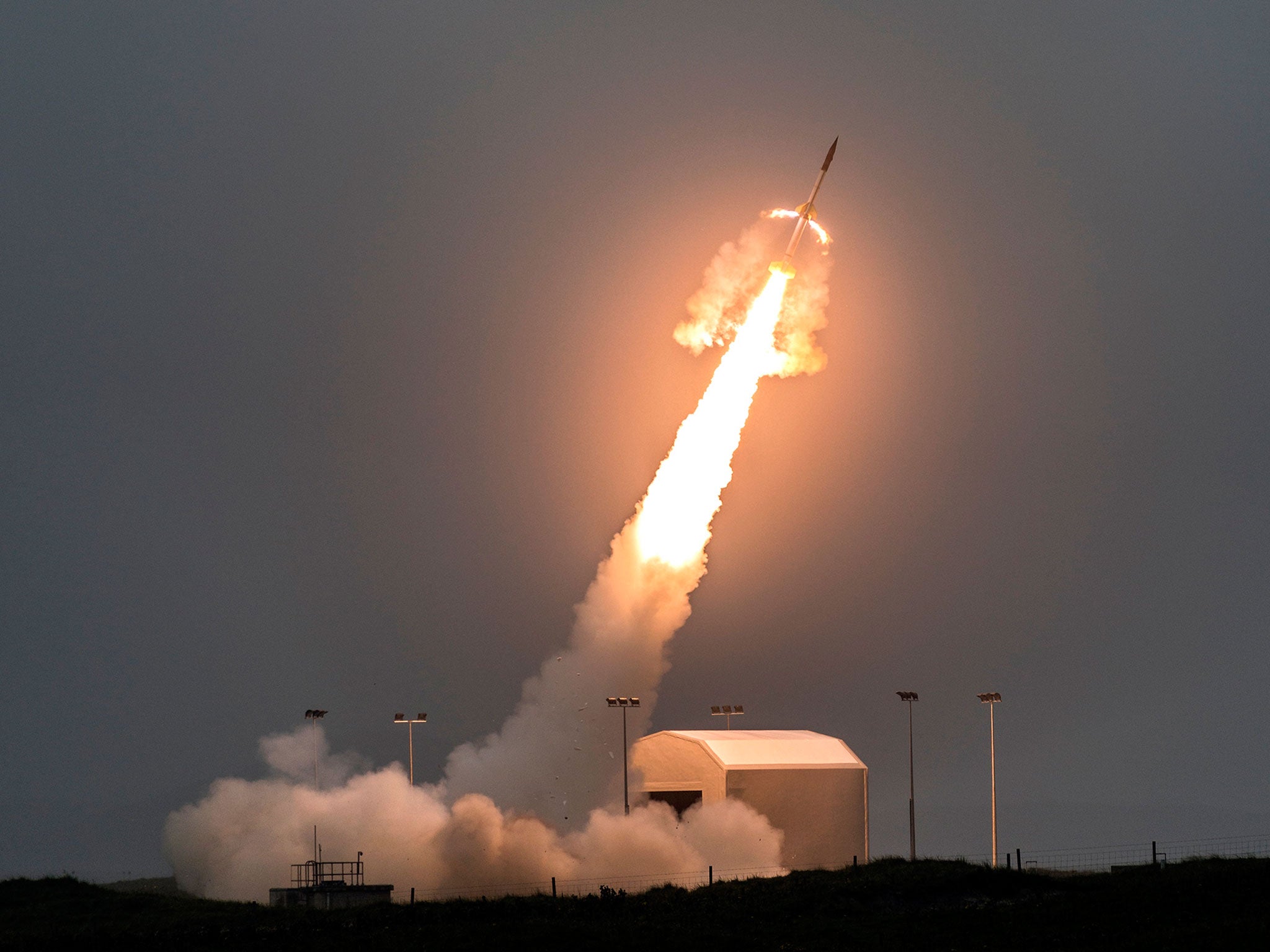North Korea: US leads missile interception tests in Scotland in response to nuclear threat
Michael Fallon says Britain is at the forefront of international response to ‘growing threat’

Your support helps us to tell the story
From reproductive rights to climate change to Big Tech, The Independent is on the ground when the story is developing. Whether it's investigating the financials of Elon Musk's pro-Trump PAC or producing our latest documentary, 'The A Word', which shines a light on the American women fighting for reproductive rights, we know how important it is to parse out the facts from the messaging.
At such a critical moment in US history, we need reporters on the ground. Your donation allows us to keep sending journalists to speak to both sides of the story.
The Independent is trusted by Americans across the entire political spectrum. And unlike many other quality news outlets, we choose not to lock Americans out of our reporting and analysis with paywalls. We believe quality journalism should be available to everyone, paid for by those who can afford it.
Your support makes all the difference.A huge new military exercise involving thousands of troops, ships and fighter jets has been launched in Scotland to practise shooting down nuclear missiles.
Michael Fallon, the Defence Secretary, said Formidable Shield would combat the threat posed by North Korea and other “rogue states”, amid intensifying tensions between Kim Jong-un and Donald Trump.
“North Korean tests have shown the danger of rogue states developing longer range missiles,” he added.
“By hosting this cutting-edge exercise in anti-missile defence with allied navies, Britain is at the forefront of developing a more effective response to this growing threat.”
Pyongyang has fired two ballistic missiles over Japan in the past month, sparking warnings for people to take cover, after appearing to make significant advances towards creating a rocket capable of carrying a nuclear warhead.
North Korea’s intensifying experiments appear to have prompted the Formidable Shield exercise, which is the first time that Nato allies have practised defending against incoming ballistic missiles with no prior warning in Europe.
It launched the day after the US sent bombers and fighter jets over waters east of North Korea to send a “clear message that the President has many military options to defeat any threat”.
Donald Trump appeared to threaten regime change in the country over the weekend, causing the North Korean foreign minister to accuse the President of “declaring war” in a speech at the United Nations.
American forces are leading the exercise off the coast of the Scotland, alongside troops from Britain, Canada, France, Germany, Italy, Spain and the Netherlands.
The Ministry of Defence (MoD) hailed Formidable Shield as “one of the most sophisticated and complex air and missile exercises ever undertaken in the UK”.
A Royal Navy Type 45 Destroyer and two Type 23 frigates are being joined by 11 other ships, 10 aircraft and 3,300 personnel for the month-long exercise.
They will work together to detect, track and shoot down live anti-ship and ballistic missiles.
Nato said the “major” exercise in the Outer Hebrides aimed to foster cooperation between allies in the face of possible threats from missile attacks.
Ships are being deployed to detect, track and defend against a range of live anti-ship and ballistic missiles, while being watched by Nato aircraft ensuring the airspace is clear.
Major components of Nato’s missile defence include four US Navy destroyers armed with the Aegis missile defence system based in Spain, a land-based system in Romania and an early warning radar in Turkey, all commanded from Ramstein base in Germany.
Commanders for the US 6th Fleet said Formidable Shield is planned to be a recurring event every two years designed to “assure allies and deter adversaries”.
Captain Shanti Sethi, commander of integrated and missile defence for the exercise, said it would “refine” capabilities and collective defence, adding: “As missile technology advances, maritime forces must be prepared to play an important role in providing swift and accurate defensive measures to deter adversaries.”
Exercises will continue until 18 October in the MoD’s Hebrides Range, off the north-west coast of Scotland.
The Government and defence contractor QinetiQ have recently spent £60m on modernising facilities in the protected area, with a further £16.8m planned for new and upgraded radars.
Join our commenting forum
Join thought-provoking conversations, follow other Independent readers and see their replies
Comments